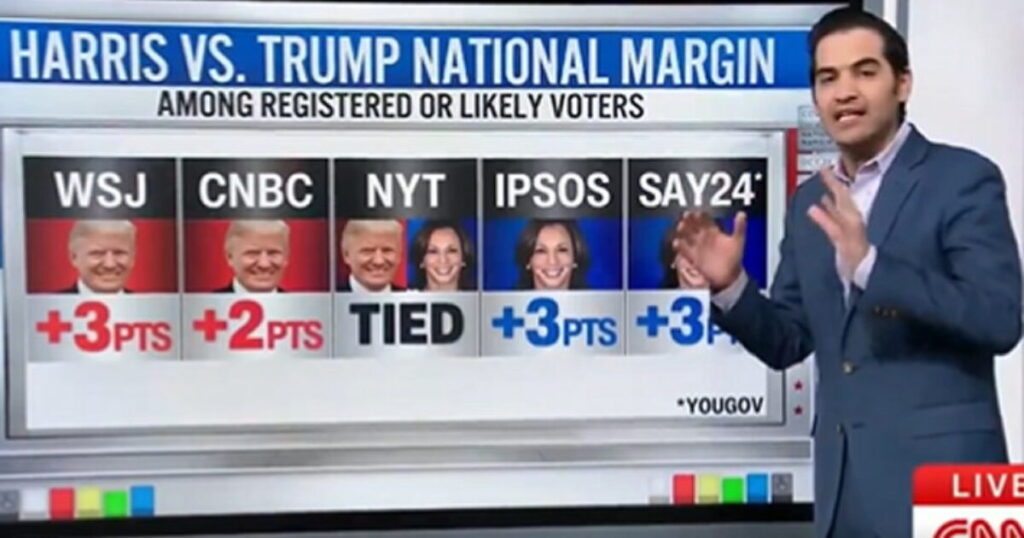Former President Donald Trump is garnering significant attention as recent analyses suggest he may have a legitimate chance of winning the popular vote in the upcoming presidential election. CNN’s data analyst Harry Enten highlighted this possibility during a broadcast, indicating that Trump’s potential success in the popular vote could dramatically shift the election landscape, especially if he also secures the Electoral College. A win in both categories would not only validate Trump’s campaign effort but would also establish an emphatic mandate that might be perceived as “too big to rig,” alluding to concerns about election integrity.
Enten’s analysis was framed by a recent poll from The New York Times and Siena College, which reported that Trump and Vice President Kamala Harris were effectively tied at 48% in the national popular vote. Such statistics indicate a competitive and closely contested race, which contrasts sharply with the outcomes of previous elections where Republicans struggled in securing the popular vote. The relevance of this potential outcome lies in its historical context, as it has been two decades since a Republican candidate has successfully won the nationwide popular vote.
The polling landscape is nuanced, with various surveys depicting Trump in a strong position. For example, polls conducted by the Wall Street Journal and CNBC show Trump leading Harris, whereas IPSOS and YouGov present a slightly different picture, with Harris in the lead but within the margins of error. This creates an environment where both candidates are neck and neck, suggesting that voter sentiment could shift dramatically leading up to the election. Ultimately, these polling dynamics portray a tightly contested race, fueling the speculation around Trump’s likelihood of winning the popular vote.
Enten emphasized that the data surrounding Trump’s current campaign reflects a marked improvement over his polling results from the 2016 and 2020 elections. Such progress has led to a renewed optimism among Trump’s supporters, reinforcing the belief that he could achieve the feat of winning the popular vote—a milestone that would be historically significant as he would be the first Republican to do so in 20 years and only the second in 36 years. This shift in the political landscape could underscore a change in voter dynamics, aligning more favorably for Trump as the election day approaches.
In light of these developments, there is both excitement and apprehension regarding Trump’s electoral prospects. For many of his supporters, the possibility of winning the popular vote symbolizes not just electoral success, but a broader validation of his policies and appeal to the American electorate. Conversely, this scenario raises concerns for those opposing Trump, who may perceive a popular vote win as indicative of a troubling resurgence in support for his controversial platform and political style.
In conclusion, as the election draws near, the implications of Trump’s potential victory in the popular vote cannot be understated. With polling data indicating a competitive race, Trump’s chances appear more favorable than in past elections. If he succeeds in both the popular vote and the Electoral College, it could reshape the political discourse in the United States for years to come, ushering in debates about electoral integrity, voter mobilization, and the evolving dynamics within the Republican party. The anticipation around these developments serves as a compelling narrative as the nation prepares for another crucial election cycle.

